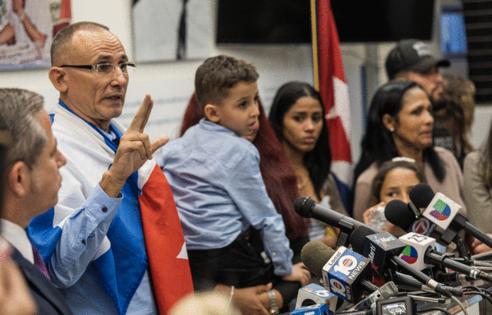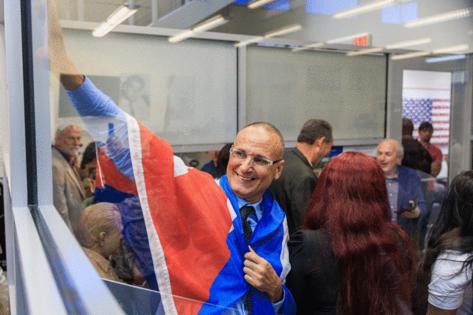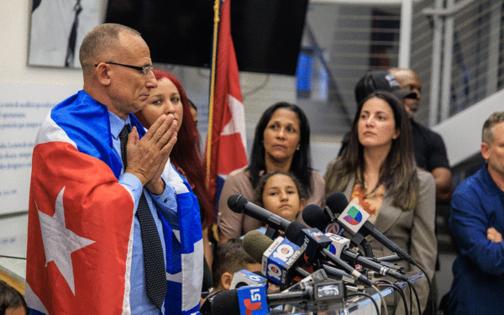Cuba frees prominent dissident Jose Daniel Ferrer, sends him into exile in the US
Published in News & Features
MIAMI — The Cuban government released dissident leader José Daniel Ferrer from prison Monday and sent him with his family into exile in the United States, the island’s foreign affairs ministry said.
The announcement comes after weeks of speculation about his possible release. Ferrer arrived in Miami with his wife, son, and other relatives Monday afternoon.
Visibly moved and surrounded by his family and activists, Ferrer said he had “mixed feelings” about this moment.
“I never thought of leaving the island,” he said in a press conference at the Cuban American National Foundation in Little Havana. He said he was happy to be reunited with his children, some of whom were already living in the United States, and other members of his family. But he noted there was “a reason to feel great sadness because there are many who are surviving in the worst conditions in the worst prisons.
“Cuba is experiencing a truly deplorable situation,” he said. “It’s a terrible situation of extreme injustice, of arbitrariness of all kinds, and hunger. There’s barely any electricity, medical services are barely functioning, transportation is barely functioning, and many homes are falling apart. Imagine then what Cuban prisons must be like.”
He vowed to continue fighting for a democratic transition in Cuba and return to the island “as soon as possible. We are going to throw them out.”
Luis Enrique Ferrer, Ferrer’s brother, said U.S. State Department officials traveled to Santiago de Cuba to secure his release.
“Welcome to freedom,” U.S. Secretary of State Marco Rubio said in a statement. “After years of repression, torture and abuses from the Cuban regime, Ferrer and his family are in the United States. The Cuban people’s desires for basic freedoms and democracy are an inspiration to many. We reaffirm our commitment to a free, fair and democratic Cuba.”
After decades of opposing the Cuban government and several stints in prison, Ferrer, whose health deteriorated in prison, said he was willing to go into exile in a letter circulated earlier this month that denounced worsening treatment in prison and threats to his family.
“The dictatorship’s cruelty against me has surpassed all limits,” he wrote in the letter he wrote in the Mar Verde prison in Santiago de Cuba. “I have suffered beatings, torture, humiliation, threats, extreme conditions, and even the theft of my food and toiletries.”
Ferrer had been arrested as he attempted to join a street protest in Santiago de Cuba during the July 2021 islandwide uprising.
The fate of one of the few remaining opposition figures who was still in the country depended on the frail relationship between the Cuban government and the United States.
The Cuban foreign affairs ministry said Ferrer was on his way to the United States “after a formal request from the government of that country and the express acceptance of Ferrer García, within the framework of the formalities of application and compliance with the law that exists between both countries.” A Trump administration official denied the U.S. had made such a request.
In the past, the Cuban government has used the release of political prisoners as a bargaining chip to obtain concessions from the United States. Just in January, the Cuban government released several political prisoners, including Ferrer, in a deal brokered by the Vatican, in exchange for being removed from the U.S. list of countries that sponsor terrorism.
But the chance of Cuba’s obtaining a similarly significant gesture looks remote with the current administration, whose foreign affairs are led by Rubio, a Cuban-American former senator from Florida who has vowed to implement a “tough Cuba policy.”
Still, the island is in a desperate economic situation, and Cuban officials are increasingly nervous about U.S. military operations near Venezuela, the island’s closest ally.
In brief comments at the Miami International Airport, U.S Rep. Mario Díaz-Balart of Miami said the U.S. government did not make concessions in exchange for Ferrer’s freedom.
“There are no concessions here; there is only strength and leadership from the United States,” he said. “The president’s name is Donald Trump; he’s not Biden or Obama, and he doesn’t believe in appeasement.”
Ferrer, the leader of the dissident organization Patriotic Union of Cuba, was one of the most prominent prisoners the Cuban government had been holding as a political bargaining chip. He had previously been in prison as one of the members of the group of 75 dissidents arrested during the so-called Black Spring in 2003.
In what activists say was a fabricated case, he was confined to house arrest in April 2000, after being accused of allegedly attacking a man. When he got out of his house to join the historic anti-government protests on July 11, 2021, he was immediately arrested. A judge then revoked his conditional release and ordered Ferrer to serve 4 years and 14 days in prison, a time he had already completed last year.
_____
©2025 Miami Herald. Visit miamiherald.com. Distributed by Tribune Content Agency, LLC.












Comments